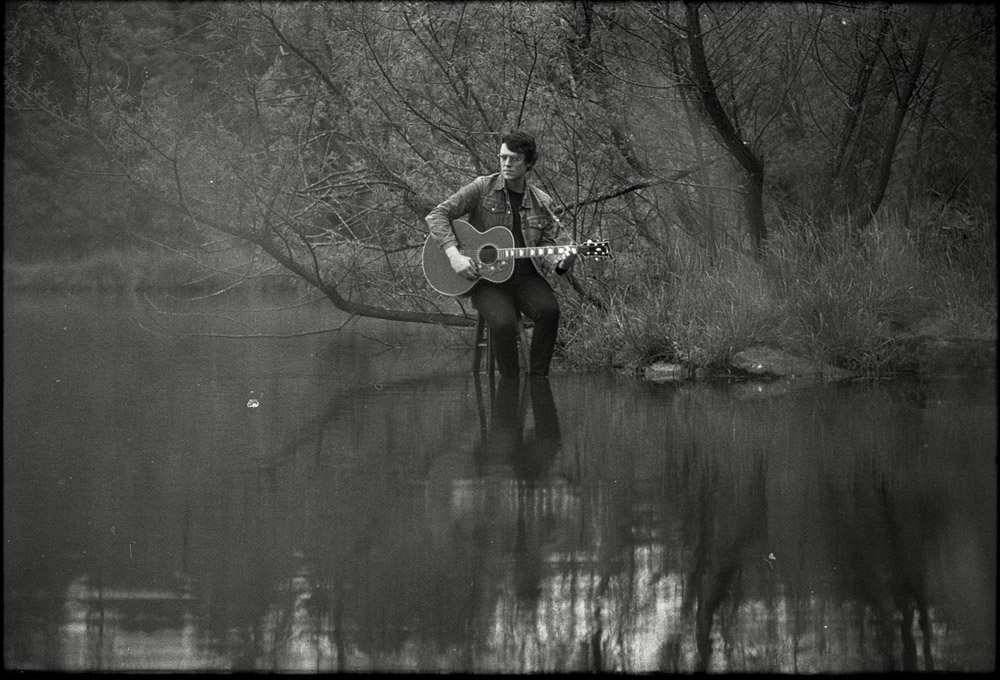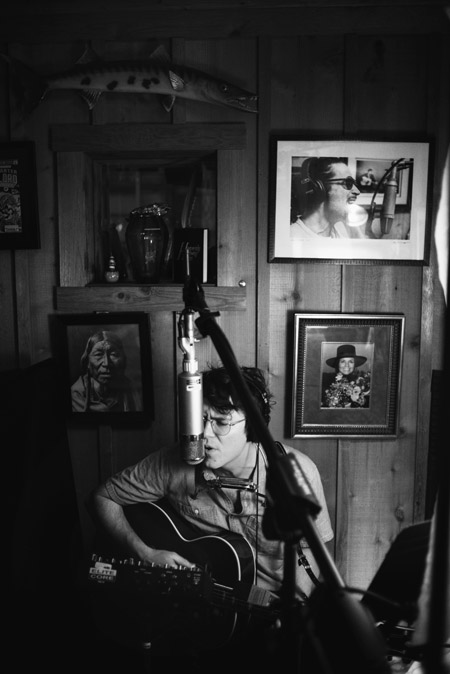“What’s most important to me is to be a link in the chain of folks singers before and after my time,” Trapper Schoepp says in light of his forthcoming album, Siren Songs. Recorded at Johnny Cash’s Cash Cabin in Hendersonville, TN, Trapper continues down the trail trod by his musical heroes. In 2019, the Milwaukee singer-songwriter published a long lost song with Bob Dylan called “On, Wisconsin” – making him the youngest musician to share a co-writing credit with the Nobel Prize laureate. The song led to a #1 trending article in Rolling Stone and over a hundred tour dates worldwide.
Most recently, Trapper is featured on the Siren Songs album cover posing in the same pond where Johnny Cash would read and dispose of letters sent to him by Bob Dylan, protecting a private correspondence and kinship that started in the sixties. At these storied grounds, Trapper recorded his strongest collection of songs steeped in traditional American and Irish folk music – aided by producers John Jackson (Jayhawks, Ray Davies) and Patrick Sansone (Wilco).
Siren Songs is an apt title for an album filled with folklore and nautical imagery. In Greek mythology, sirens are enchanting half-bird maidens who sing to entice sailors off their ships, and ultimately to their doom.
Trapper conjures nautical tales in songs like “Secrets of the Breeze” inspired by his own brushes of danger in Lake Michigan: “I felt the waves come crashing down / And I was so deep, so deep I might have drown / But I held my breath and the tide pushed me / No more do I explore the secrets of the breeze.”
“Queen of the Mist” is a jaunty tune with cruising congas and harmonica hooks that recounts Annie Edson Taylor’s harrowing trip over Niagara Falls inside a wooden barrel in 1901. In the swamp rocking “Devil’s Kettle,” Trapper sings of a mysterious rock formation and waterfall he encountered along Highway 61. A river splits below the falls, with one tributary to Lake Superior and the other flowing underground to an unknown location. It is said gangsters like Al Capone and his men would head across the northern state border to dispose of the evidence in the natural phenomenon called the Devil’s Kettle.
Sirens are seen across the album and in works that inspire Schoepp, most notably in the Coen Brothers’ O’Brother Where Art Tho. In a fortunate stroke of serendipity, Trapper is joined on two tracks by Sarah Peasall McGuffey, who famously lent her vocal talents to the aforementioned film. Trapper sings alongside his brother and bassist, Tanner Schoepp, with characteristic blood harmony, the unique blend of sibling singers. The studio band included drummer Jon Radford (Justin Townes Earle), John Jackson on mandolin and violin, Patrick Sansone on keys, Quinn Scharber on Nashville tuned guitar, and Jim Hoke (Dolly Parton, Paul McCartney) on tin whistle and accordion.
The influence of Irish music on Siren Songs can be heard in Trapper’s open tuned acoustic guitar, the traditional feeling ballads, lyrical themes of the sea, war and unrequited love, as well as the instrumentation. “Irish folk music really helped me during the pandemic,” Schoepp says. “There’s an uplifting quality in this tradition that can break your heart and make you laugh at the same time.”
Trapper notes the Clancy Brothers, The Chieftains and Paul Brady as key inspirations on Siren Songs. “If it weren’t for the song ‘Arthur McBride’ by Paul Brady, this album probably wouldn’t exist,” Trapper posits. So struck by the song, he tuned his guitar to open D like Brady and learned new chord shapes by watching YouTube videos of him performing. “It was a complete revelation,” Trapper says of the open D tuning, which is utilized by artists like Joni Mitchell and Neil Young.
The historic Cash Cabin was an inspiring and homey environment to record 14 songs in one week’s time. What was initially Johnny’s private rustic sanctuary to recharge—cooking, movies, leathercraft—later evolved into his working studio. “Everyone from Dolly Parton to Snoop Dog has visited the Cabin, and it was an unforgettable experience I am eternally grateful for, ” Trapper says.
Trapper and band recorded the tracks live together, forgoing click track technology to allow the ebb and flow of a live performance. “By the fourth or fifth take, we’d have most of what you hear,” Trapper says of this approach. “There’s an intensity and joy to being in that shared moment, especially after going through the isolation of the pandemic.”
The opportunity to play instruments like Cash’s 1930s “shitkicker” Martin guitar and June Carter Cash’s Steinway piano certainly helped inspire the players. A fold-up harmonium organ caught the ears of Pat and Trapper. “This kind of organ was once used by military chaplains to hold services on battlefields, and it’s remarkable that it is still sharing stories in 2022,” Trapper says. “There’s a power in well-used instruments like this that can be really effective in the right hands in the right song.”
Producer Patrick Sansone plays said organ on “Good Graces,” a romantic lament of lovers hitting a crossroads. The song has throughlines and characters in common with “In Returning” and “Eliza,” the latter is a story of a woman who moves to be with her mother after her father is lost at sea, leaving the narrator behind to sing a siren of his own.
Schoepp depicts characters reaching crossroads in “Cliffs of Dovers,” a narrative of a soldier struggling with PTSD after returning from Iraq. On “Silk and Satin,” Trapper uses maritime jive to discuss a person living out a double life as a businessman by day and drag queen by night. He adds, “In a different kind of undercover drag, I heard of sailor wives who who would crossdress as men to be with their husbands at sea,” Trapper says. “I think such an extraordinary risk is romantic.”
The album art photography was taken on the studio grounds by Joseph Cash, who also directed a music video for “Cliffs of Dover.” Musically, Cash contributed Dobro on “Devil’s Kettle” and vocals on “Diocese.” The music video finds Trapper and band recording the song and exploring the Cabin grounds.
After having spent the last decade performing countless live dates and sharing stages with such like-minded Americana mainstays as The Wallflowers, The Jayhawks, Frank Turner and Old 97’s, Schoepp will take to the road again with Siren Songs in 2023. “This kind of folk music is a living, breathing artform that really comes to life when shared,” Trapper says. “I can’t wait to take these songs to the people.”


